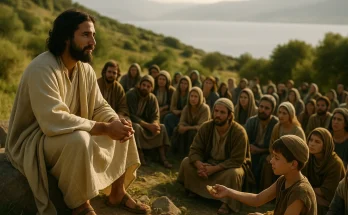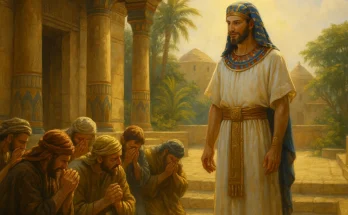- Writer of the Book of Joshua
- Date Written
- To Whom Written
- Purpose of the Book of Joshua
- Historical Context
- Key Themes
- Major Events/Stories in the Book of Joshua
- Theological Contributions of the Book of Joshua
- Special Consideration in the Book of Joshua
- Book of Joshua Conclusion
- Frequently Asked Questions (FAQ) About the Book of Joshua
Have you ever wondered what it takes to truly step into the promises of God? The book of Joshua shows us that the journey to receiving God’s promises isn’t always smooth, but it’s filled with battles, courage, and unwavering faith. As we open this book, we find ourselves standing at a pivotal moment in Israel’s history—Moses has passed, and leadership has now shifted to Joshua. Can you imagine the pressure he must have felt? Taking over from a legend like Moses is no easy task!
The book of Joshua is all about transition and triumph. It’s the story of God’s people finally stepping into the Promised Land, but not without a fight. Through battles, strategic leadership, and moments of deep reliance on God, we see the fulfillment of promises made generations earlier. But Joshua’s leadership isn’t just about military victories—it’s about staying true to God’s covenant and trusting Him, even when the odds are stacked against us.
So here’s the question: What does it look like to trust God fully when you’re facing your own “Jericho”? Let’s dive into the book of Joshua and discover together how faith and obedience lead to victory.
Writer of the Book of Joshua
The book of Joshua is traditionally attributed to Joshua, the leader of Israel who succeeded Moses. As Moses’ faithful servant and military commander, Joshua was uniquely positioned to recount the events of Israel’s conquest of Canaan. The book of Joshua highlights not only his leadership in battle but also his spiritual devotion to God’s commands.
While Joshua is widely regarded as the primary author, scholars suggest that other sources or scribes may have contributed to portions of the text, particularly the sections that detail Joshua’s death and the subsequent events. These additions would have been natural as the story needed to be completed after Joshua’s passing.
There is significant internal evidence supporting Joshua’s authorship. The book is written from the perspective of someone with firsthand knowledge of the military campaigns and intimate details of Israel’s journey into the Promised Land. The frequent use of the term “we” in certain passages also suggests the author was involved in the events being described.
While some editing or later contributions may have occurred, the central figure of Joshua remains crucial, and his role as both a leader and a faithful servant of God is preserved throughout the book of Joshua.
Date Written
The book of Joshua is estimated to have been written between 1400–1375 BC, shortly after the events it describes. These events took place soon after the Israelites’ exodus from Egypt and their 40 years of wandering in the wilderness. Joshua, as the leader who guided Israel into the Promised Land, led the nation through significant battles and the distribution of land among the tribes, all of which are detailed in the book.
The date of writing aligns with the historical context of the late Bronze Age. Various historical clues within the text, such as the types of cities, military strategies, and cultural practices, point to this period. For instance, the mention of Jericho’s walls and the conquest of fortified cities reflect the geopolitical landscape of Canaan at that time.
The book of Joshua was likely written near the end of Joshua’s life, as it also includes details of his death and the final instructions he gave to the Israelites. While some minor additions may have been made later by scribes, the core of the book reflects Joshua’s firsthand account of the Israelites’ settlement in Canaan, making it a valuable historical and theological document.
To Whom Written
The book of Joshua was written primarily for the Israelites, serving as a historical record of their conquest of the Promised Land and as a reminder of God’s faithfulness. It was important for the people of Israel to remember how God fulfilled His promises to their ancestors—leading them out of Egypt, through the wilderness, and into Canaan under Joshua’s leadership. This book was not only for the generation who lived through these events but also for future generations, so they could see how God’s power and promises remained true over time.
Beyond being a historical account, the book of Joshua carries deep spiritual lessons that apply to all believers. It teaches us about the importance of faith and obedience to God. Just as Joshua and the Israelites trusted God through battles and challenges, modern readers are encouraged to trust God in their own lives.
The book of Joshua, while documenting Israel’s specific journey, serves as a testament of faith for all who follow God. It reminds us that God is faithful to His promises and that, through obedience and courage, we can step into the victories He has planned for us.
Purpose of the Book of Joshua
The purpose of the book of Joshua is threefold. First, it serves to document the conquest of Canaan under Joshua’s leadership. This historical record details the battles, strategies, and victories that led the Israelites into the Promised Land, fulfilling the promise God made to their ancestors. Joshua’s role as the leader appointed by God is central to this narrative, showing how he guided Israel in obedience to God’s commands.
Second, the book of Joshua demonstrates God’s faithfulness in fulfilling His promises. The events recorded showcase how God delivered on the covenant He made with Abraham, Isaac, and Jacob by giving their descendants the land of Canaan. Despite the obstacles they faced, the Israelites were able to conquer the land because God was with them, guiding and empowering them through Joshua.
Finally, the book provides lasting examples of faith, obedience, and judgment. Stories like the fall of Jericho illustrate how faith in God’s instructions leads to victory, while the story of Achan’s sin at Ai serves as a warning about the consequences of disobedience. The book of Joshua reminds us that God rewards faithfulness but also executes judgment when His commands are disregarded.
Historical Context
The book of Joshua is set in a pivotal time for the Israelites, as they entered the Promised Land after 40 years of wandering in the wilderness. Having been freed from slavery in Egypt, the Israelites were now ready to take possession of Canaan, the land promised to their ancestors. This period marked a significant transition from nomadic life to settling in a land filled with fortified cities and established kingdoms.
The Canaanites, who inhabited the land, practiced a polytheistic religion and engaged in immoral practices, which often included child sacrifice and ritual prostitution. These cultural and religious differences set the stage for conflict, as God had commanded the Israelites to drive out the Canaanites and cleanse the land of their idolatry.
Politically, the land of Canaan was not unified but consisted of various city-states, each ruled by a king. These kings often formed alliances with each other to defend against external threats. The book of Joshua records the Israelites’ battles with these kings and their eventual conquest of key cities like Jericho and Ai. The historical context of the book of Joshua highlights the challenges Israel faced as they transitioned into the Promised Land while adhering to God’s instructions.
Key Themes
The book of Joshua centers on several key themes that illustrate God’s faithfulness, the importance of obedience, and the balance between judgment and mercy. These themes provide valuable lessons for believers today.
God’s Faithfulness is a primary theme, seen in the fulfillment of God’s covenant with Abraham. After centuries of waiting, God led the Israelites into the Promised Land, just as He promised. The victories throughout the book demonstrate that God keeps His promises and rewards those who trust in Him.
Another significant theme is obedience to God’s commands. Throughout the book of Joshua, success comes only when the Israelites follow God’s instructions completely. The miraculous fall of Jericho is a prime example of victory through obedience. In contrast, disobedience, as seen in Achan’s sin, leads to defeat at Ai, showing the serious consequences of disregarding God’s commands.
The book also emphasizes judgment and mercy. While many Canaanites faced destruction because of their wickedness, the story of Rahab highlights God’s mercy. Rahab, a Canaanite, was saved because of her faith in God, illustrating His willingness to show mercy to those who trust in Him.
Finally, leadership is key in the book of Joshua. Joshua exemplifies godly leadership through his courage, faith, and reliance on God. His life serves as a model for leading with integrity and trusting in God’s direction.
Major Events/Stories in the Book of Joshua
The book of Joshua is filled with major events and stories that demonstrate God’s power, the importance of obedience, and the fulfillment of His promises.
The Crossing of the Jordan River (Joshua 3–4) is a pivotal moment where the Israelites miraculously crossed the river on dry ground. This event symbolized their entry into the Promised Land and reaffirmed God’s presence with them, just as He had been with Moses at the Red Sea.
The Fall of Jericho (Joshua 6) is one of the most famous stories in the book of Joshua. Through faith and an unconventional battle strategy, the Israelites marched around the city for seven days, and the walls of Jericho collapsed. This victory demonstrated the power of obedience to God’s seemingly unusual instructions.
However, the Israelites soon faced defeat at Ai due to Achan’s Sin (Joshua 7). Achan’s disobedience brought judgment on the people, showing the serious consequences of ignoring God’s commands.
The Conquest of the Southern and Northern Kings (Joshua 10–11) records the major battles where Joshua led the Israelites to defeat numerous kings, establishing control over much of Canaan.
Finally, the Division of the Land (Joshua 13–21) marked the fulfillment of God’s promise as the land was allocated among the twelve tribes of Israel, securing their inheritance in the Promised Land.
Theological Contributions of the Book of Joshua
The book of Joshua offers significant theological contributions that shape our understanding of God’s nature, the consequences of sin, and the foreshadowing of Christ.
First, the book of Joshua presents God as both a warrior and a covenant keeper. Throughout the conquest of Canaan, God is depicted as a mighty warrior who fights for His people, ensuring their victories over seemingly impossible odds. At the same time, He is a faithful covenant keeper, fulfilling the promises made to Abraham, Isaac, and Jacob by delivering the Promised Land to their descendants. This dual role highlights God’s power in battle and His faithfulness in fulfilling His word.
The book also emphasizes the importance of holy living and the consequences of sin. The story of Achan’s disobedience (Joshua 7) illustrates that sin not only affects the individual but can bring consequences on the entire community. Joshua’s leadership underscores the necessity of purity and obedience to God’s commands in order to maintain His favor and blessing.
Finally, Joshua serves as a foreshadowing of Jesus. Joshua’s name, meaning “The Lord saves,” points forward to Jesus, the ultimate Savior. Just as Joshua led the Israelites into the Promised Land, Jesus leads His people into eternal rest, offering salvation and victory over sin. The book of Joshua, therefore, provides a powerful typology of Christ’s redemptive work.
Special Consideration in the Book of Joshua
The book of Joshua raises important special considerations regarding the ethical and theological implications of the conquest of Canaan and its destruction, as well as the historical evidence supporting its events.
One major issue is the ethical implications of the conquest and the destruction of the Canaanites. The command for the Israelites to completely destroy the inhabitants of Canaan (Joshua 6:17-21) often raises questions about God’s justice and mercy. This can be challenging to understand, especially in a modern context. However, the book of Joshua shows that the Canaanites were judged for their wickedness, including practices like child sacrifice and idolatry. The conquest reflects God’s holiness and His intolerance of sin, demonstrating that His judgment was not arbitrary but rooted in divine justice.
Understanding God’s judgment in light of His holiness and justice is essential. The destruction of the Canaanites was part of God’s plan to protect the spiritual purity of Israel and fulfill His covenant promises. The book of Joshua reminds us that God’s ways are higher than ours, and His judgment is always aligned with His holiness and righteousness.
There is also archaeological evidence supporting the events in Joshua, such as the discovery of ancient Jericho’s walls. While debates exist, many findings corroborate aspects of the conquests described in the book of Joshua, providing historical support to the biblical narrative.
Book of Joshua Conclusion
In conclusion, the book of Joshua highlights the legacy of Joshua as a faithful leader who trusted in God’s promises and guided Israel into the Promised Land. His courage, obedience, and reliance on God serve as a powerful example for all believers. Through his leadership, we see the fulfillment of God’s covenant with Abraham and the demonstration of God’s faithfulness in keeping His word.
The book of Joshua encourages us to trust in God’s promises, even when facing seemingly insurmountable challenges. It teaches that obedience to God’s commands leads to success, while disobedience results in consequences. Joshua’s story reminds us that God is both a warrior who fights for His people and a covenant keeper who rewards faithfulness.
The book of Joshua continues to impact biblical theology and Christian living by showing the importance of faith, obedience, and godly leadership. It also foreshadows the ultimate deliverance through Jesus, the greater Joshua, who leads His people into eternal rest. As we reflect on the book of Joshua, we are encouraged to walk in faith, trusting that God will fulfill His promises in our lives as He did for Israel.
Frequently Asked Questions (FAQ) About the Book of Joshua
1. Who wrote the book of Joshua? The book of Joshua is traditionally attributed to Joshua himself, though some scholars believe other scribes may have contributed, especially in recording events that occurred after his death.
2. What is the main theme of the book of Joshua? The main theme is God’s faithfulness in fulfilling His covenant promises to Israel by giving them the Promised Land. The book also emphasizes the importance of obedience to God’s commands and the consequences of disobedience.
3. Why was the destruction of the Canaanites necessary? The destruction of the Canaanites was a result of their sinful practices, including idolatry and child sacrifice. God’s judgment on them reflects His holiness and desire to protect Israel from falling into the same sinful ways.
4. What lessons can we learn from Joshua’s leadership? Joshua’s leadership teaches us the importance of trusting God, obeying His commands, and having courage in the face of challenges. His faith and commitment to God serve as a model for godly leadership.
5. How does the book of Joshua point to Jesus? Joshua’s name means “The Lord saves,” and he serves as a foreshadowing of Jesus, the greater Joshua, who leads His people into eternal rest and salvation.



